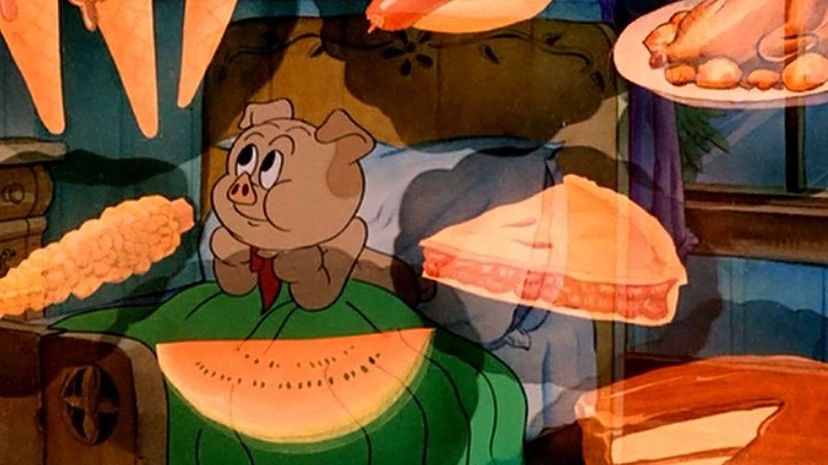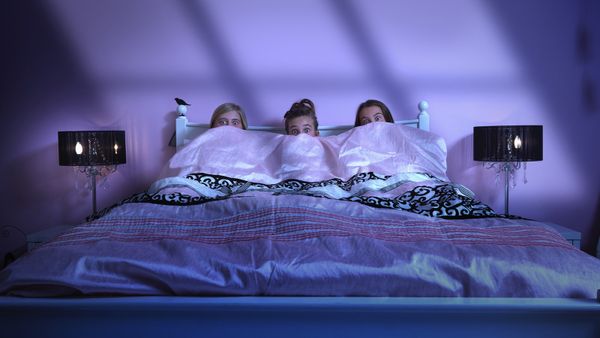
Key Takeaways
- A study sought to explore whether certain foods, like dairy products and spicy food, eaten late at night can cause nightmares.
- The research found that nearly 18 percent of participants believed specific foods affected their dreams.
- Distinct patterns emerged from the study: Those experiencing disturbing dreams often had poorer sleep and diet habits, while those with vivid but not disturbing dreams reported better sleep quality and healthier diets.
If you've ever had a meat-lovers, stuffed-crust pizza before bed, then spent your dreams being chased around by saber-toothed wildebeests wearing top hats, you might have blamed the bizarre and unsettling experience on your evening "snack."
This tendency is so prevalent that a recent Frontiers in Psychology study endeavored to crack the supposed relationship between diet and dreams. “There is extremely little information available and also some important misinformation that keeps getting recycled,” emails Dr. Tore Nielsen, psychiatry professor and director of the Dream and Nightmare Laboratory at the Center for Advanced Research in Sleep Medicine, University of Montreal.
Advertisement
This lack of hard data is surprising, given society's fascination with all things food and dream-related. “This research was motivated in large part by the media itself; questions about food and dreams are among the most frequent questions we are asked," says Nielsen. These questions come up particularly around food-centric holidays like Halloween, Christmas and Thanksgiving.
The most commonly blamed nightmare-inducing culprits are cheese, spicy foods and eating too much right before bedtime. But is there any truth to this folklore? Nielsen and his team surveyed nearly 400 participants on a range of topics, such as sleep and diet quality, and asked them to report whether they thought food affected their dreams, or not.
Almost 18 percent of the participants indicated that they thought eating certain foods (or eating right before bed) made a difference in the development of disturbing dreams, with dairy products like milk, cheese, yogurt and ice cream as well as pizza being the most commonly listed (39 to 44 percent). Also blamed for disturbing dreams but to a lesser extent than dairy, were foods of the spicy, starchy or meat-based varieties.
Overall, sweets and chocolates were the second-most frequently mentioned category for dream-inducing foods after dairy, but they were most likely to foster bizarre dreams (not necessarily unpleasant, but still strange, like being able to fly) as opposed to disturbing dreams (like being chased by a werewolf).
The second part of the study delved deeper into the subjects themselves. “When we broke down our sample into subjects who reported disturbing dreams and those who reported vivid (but not disturbing) dreams, we found that there were two very different profiles,” Dr. Nielsen explains. “The disturbed dreamers had higher pathological indicators like poorer sleep, binge-eating or emotional eating, whereas the vivid dreamers had higher wellness indicators like better sleep, healthier diet and longer times between eating (what we consider a proxy measure of fasting).”
The fasting note struck a chord with the scientists because various cultures have long documented the effect of the practice on dreams. “The finding for fasting, in particular, was of interest because of very old literature documenting how different peoples have used fasting to induce the recall of spiritual and life-guiding dreams (‘vivid dreams' in our study),” he says. Although it might be a stretch to recommend fasting if you're looking for some type of nocturnal divine intervention, it's certainly preferable to dream vividly, in place of a nightmare starring a deranged ax murderer.
There are any number of theories on why certain foods affect our dreams. People with certain health considerations, like gastroesophageal reflux disease (GERD) have different sensitivities than others.
“Foods that affect GERD tend to be either spicy or fatty foods,” says Amy Korn-Reavis with Emery Sleep Solutions in Orlando, Florida, via email. “The closer you eat them to bedtime, the more likely they are to affect you. This is because they are heavier and produce more acids to digest. This causes people with weak muscles at the top of their stomach to have acid move into their esophagus.” She notes that this added effort impacts the time and length of valuable REM sleep, thereby affecting the type and duration of dreams.
"Other foods that may affect sleep is really [based on the] individual. I have heard that some patients find that if they eat simple sugars like candy or chocolate, they have more vivid dreams. This may be because they have lighter REM [sleep] due to the higher glucose levels in the blood but there are not a lot of studies on it," she adds.
Research on the subject of diet and dreams is far from over. “We need to start experimental studies that systematically vary what people eat (and when) and whether this induces any regular change in their dream content,” Nielsen says.
Advertisement


